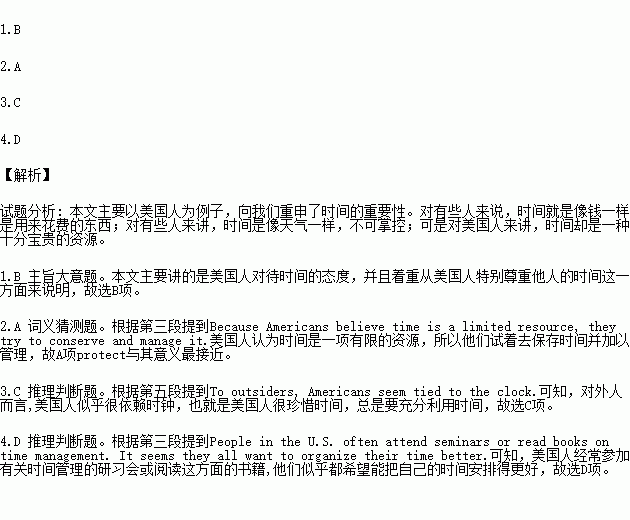题目内容
阅读下列短文 ,从每题所给的四个选项 (A、B、C、和D)中 ,选出最佳选项。
What is time? Is it a thing to be saved or spent or wasted, like money? Or is it something we have no control over, like the weather? Is time the same all over the world?
That's an easy question, you say. Wherever you go, a minute is 60 seconds, an hour is 60 minutes, a day is 24 hours, and so forth. But in America, time is more than that. Americans see time as a valuable resource. Maybe that's why they are fond of the expression, "Time is money."
Because Americans believe time is a limited resource, they try to conserve and manage it. People in the U.S. often attend seminars or read books on time management. It seems they all want to organize their time better. Professionals carry around pocket planners — some in electronic form — to keep track of appointments and deadlines. People do all they can to squeeze more time out of their time. The early American hero Benjamin Franklin expressed this view best: "Do you love life? Then do not waste time, for that is the stuff life is made of."
To Americans, punctuality is a way of showing respect for other people's time. Being more than 10 minutes late to an appointment usually calls for an apology and an explanation. People who are running late often call ahead to let others know of the delay. Of course, the less formal the situation is, the less important it is to be exactly on time. At informal get-togethers, for example, people often arrive as much as 30 minutes past the appointed time.
To outsiders, Americans seem tied to the clock. People in other cultures value relationships more than schedules. In these societies, people don't try to control time, but to experience it. Even Americans would admit that no one can master time. Time — like money — slips all too easily through our fingers. And time — like the weather — is very hard to predict. Nevertheless, time is one of life's most precious gifts. And unwrapping it is half the fun.
1.What’s the main topic of this passage?
A. What is time? B. Time among Americans.
C. Make good use of time. D. How to control time?
2.What’s the meaning of the underlined word “conserve”?
A. protect B. develop
C. produce D. assist
3.The sentence "Americans seem tied to the clock" in paragraph 5 probably means ________.
A. Americans often carry a clock with them.
B. Americans can take control over time.
C. Americans often make full use of time.
D. Americans can not predict the time.
4.We can safely draw a conclusion from this passage that _________.
A. Americans have more time than others
B. by using pocket planners, people can have more time
C. for informal meeting, Americans often arrive 30 minutes earlier
D. Americans often attend seminars, because they want to use time better

